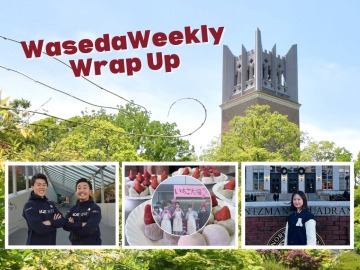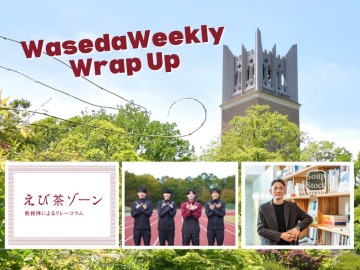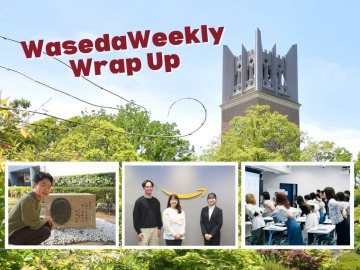A New Addition to the Wasemeshi Scene: “Kitchen Green Peace”, an Authentic Western Restaurant Run by Two Brothers
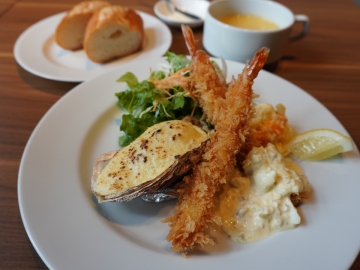
Waseda Weekly reporter (SJC Student Staff) Risaki Sato, a fourth-year student in the School of Human Sciences, contributed this article for the reoccurring series “My Waseda Cuisine.” Kitchen Green Peace is located close to Waseda Campus’ Building 29, about five minutes walking along Waseda Street towards Takadanobaba Station from Tokyo Metro Tozai Line’s Waseda Station. Two brothers, who are also chefs, opened the restaurant in December of 2022 and it has become a rising star on the Wasemeshi (Waseda Cuisine) scene. The brothers decided to open their own restaurant when a rental space became available in their family home. Actually, the name of the restaurant “Green Peace” (which also sounds like green peas) comes from a pun on their last name “Endo”. Endo-mame means green peas in Japanese.
Kitchen Green Peace is popular for its authentic Western-style lunches offered at affordable prices. The menu includes two different daily lunch specials, along with four standard dishes. Waseda University faculty and staff, along with local residents and visitors of the Waseda University Extension Center often drop by for lunch. Thanks to its convenient location right on Waseda Street and its reasonable prices from 1,000 yen, it’s a great place for students too!
The restaurant’s number one commitment is to, “make as much as possible by hand, even down to the smallest details.” The tartar sauce and salad dressing that come with the fried shrimp are homemade. The soup that accompanies the daily lunch special is made using seasonal vegetables, as well. As the weather turns cold, why not try the freshly prepared, chef specialty of piping hot french fries, hamburg steak, and soup?
Japanese article:兄弟シェフが腕を振るう本格洋食店がワセメシに仲間入り 名店誕生の予感!
Professor Yamada, Please Tell us, “How Do We Keep the Peace?” Part 1
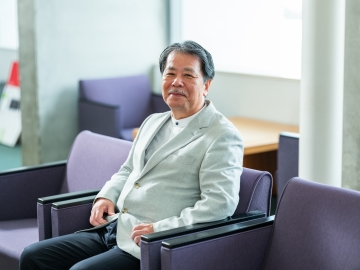
In the series “Lectures by Experts”, four professors provide hints about how to potentially solve some of the problems that challenge society. The theme for 2023 is “How Do We Keep the Peace?” Following Russia’s invasion of Ukraine and the developments in Palestine, it is necessary to rethink what peace is. Waseda Weekly’s fourth and final guest is Professor Mitsuru Yamada (Faculty of Social Sciences), who researches peacebuilding theory and international cooperation theory with a focus on fieldwork. In Part 1 of the interview, he shared his thoughts on peace and the perspectives necessary to protect it.
In response to what “peace” means, Professor Yamada noted how many people may imagine it as the absence of war, but the absence of war does not necessarily mean peace. He pointed to Indian peace researcher Sugata Dasgupta who proposed that the opposite of peace is not war, but “peacelessness.” Prior to this, the field of peace studies had focused on how to prevent war. Dasgupta raised the issue of India and other nations in the East that are not at war and yet cannot be described as “peaceful” and argued that elements that affect peace include poverty, hunger, and discrimination. Professor Yamada then related how Norwegian sociologist Johan Galtung is widely believed to have been influenced by Dasgupta. Galtung says that “peace = the absence of war” is nothing more than “negative peace.” He proposed that “positive peace” is a state free of “structural violence” and “cultural violence,” which includes numerous issues built into social structures. To realize “positive peace,” Professor Yamada said we must be conscious not only of direct violence such as war, but also of “invisible violence” such as poverty, hunger, and discrimination within the social structure. In that sense, the root of peace is the ability to live our daily lives without being threatened by various forms of violence.
Professor Yamada also called for people to view situations from both sides, rather than in the binary terms of dictatorship vs. democracy. The requirement should be to build peace eclectically between the local population and liberalism while respecting the values of each country. In response to Waseda Weekly’s question of how to preserve peace, Professor Yamada first summarized the usual response: the international community’s focus on “justice.” One example is the denouncement of Russia’s invasion of Ukraine as a violation of international law and the imposition of sanctions. As a result, Japan has provided military support to Ukraine in the form of economic aid and arms supplies. Professor Yamada argued, however, that we must not forget that the lives of innocent civilians continue to be taken away against the backdrop of military and economic sanctions. His goal is not to deny the international community’s response. Professor Yamada stressed, instead, that the international community’s priority should be to protect people’s lives and daily livelihoods. Peacebuilding requires not only the pursuit of justice but also the perspective of finding realistic ways to achieve an immediate ceasefire and protect daily life.
Japanese article:「平和をどう守る?」教えて! 山田教授(前編)
A Rising Star in the Ruby World Takes to the World Stage as a Referee
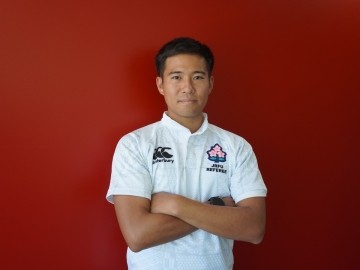
For this article, part of the “People” series that introduces remarkable Waseda students and their activities, Waseda Weekly interviewed School of Commerce fourth-year student Katsuki Furuse about how he became interested in rugby, his experience as a referee, and his plans for the future. Katsuki is a referee with Waseda University’s Ruby Football Club. On top of that, he also acts as a referee for various official matches both domestically and internationally. In 2023, Japan Rugby League One (hereafter League One) awarded him the “Best Whistle Award” in recognition of his success.
Katsuki first became involved in rugby as a junior high school student when he began to play for his school’s team. After ending his time as a rugby player, Katsuki was offered his first chance to referee while attending practice with his former junior high school club when his coach asked him to stand in. Shortly after, he moved on to high school which also had a strong rugby team, but Katsuki was worried about balancing his time-consuming coursework along with the demanding rugby schedule. In the end, he chose not to continue playing. He was, however, approached and asked to referee whenever there were practice games, and while he wasn’t an official member of the team, he was treated as one. Following his experience in junior high and high school, Katsuki felt refereeing was fun and exciting, so he decided to pursue it more seriously. As a result, he entered Waseda University where he currently balances his time between refereeing for the University’s rugby club as well as for League One.
Since high school, the Japan Rugby Football Union has continuously supported Katsuki, including through a program that promotes the development of young referees currently called the Referee Academy System. Through this program, in 2023 Katsuki participated in a camp held in South Africa and refereed league matches in South Korea and the Asian Rugby Championship held in Hong Kong. To realize his dream of refereeing at the Rugby World Cup, Katsuki is planning to increase his experience refereeing abroad after graduating from Waseda. There is almost no precedent of a young person from Japan becoming an internationally active referee, but Katsuki, “…wants to do [his] best moving forward one step at a time.”
Japanese article:ラグビー界期待の新星 レフェリーとして世界の舞台へ


